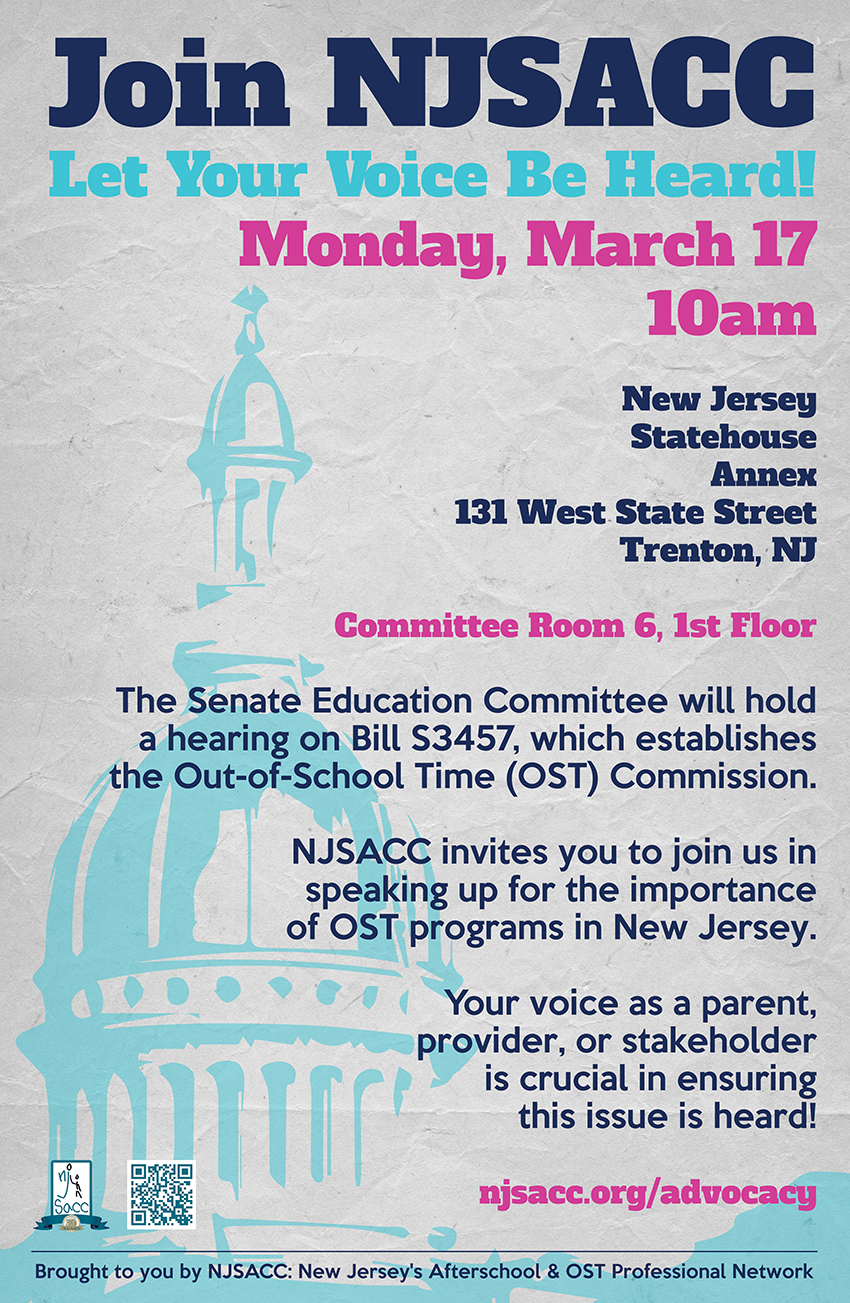NJSACC Advocacy In Action: Latest Blog Post (March 2025)
Governor Murphy’s FY2026 Budget Proposal: What It Means for School-Age Child Care
WESTFIELD, NJ — Governor Phil Murphy recently unveiled his proposed $58.1 billion budget for Fiscal Year 2026 (FY2026), emphasizing affordability, education, infrastructure, and economic growth while maintaining fiscal responsibility. While explicit investments in school-age child care (SACC) were absent, several key education initiatives intersect with the landscape of child care providers serving children ages 3-13.
Continued Investment in Early Education: The Governor’s budget proposes a $1.3 billion investment in pre-K expansion and a new legislative initiative requiring full-day kindergarten in every school district. While these investments primarily target younger children, they have a direct impact on the broader child care ecosystem. The expansion of pre-K and kindergarten access will influence enrollment patterns in before- and after-school care programs, as well as affect the financial sustainability of mixed-age child care centers that serve both preschool and school-age children.

WESTFIELD, NJ — Governor Phil Murphy recently unveiled his proposed $58.1 billion budget for Fiscal Year 2026 (FY2026), emphasizing affordability, education, infrastructure, and economic growth while maintaining fiscal responsibility. While explicit investments in school-age child care (SACC) were absent, several key education initiatives intersect with the landscape of child care providers serving children ages 3-13.
Continued Investment in Early Education: The Governor’s budget proposes a $1.3 billion investment in pre-K expansion and a new legislative initiative requiring full-day kindergarten in every school district. While these investments primarily target younger children, they have a direct impact on the broader child care ecosystem. The expansion of pre-K and kindergarten access will influence enrollment patterns in before- and after-school care programs, as well as affect the financial sustainability of mixed-age child care centers that serve both preschool and school-age children.
The NJ Office of Licensing defines a child as any person under 13 years old and recognizes school-age child care programs as those that operate outside of regular school hours. This includes care for children in kindergarten and pre-K, provided they attend no more than three and a half hours in these programs. As more children transition into full-day kindergarten and expanded pre-K programs, child care providers will see increases in demand for wraparound services, necessitating strategic planning and collaboration with school districts.
K-12 Education and Student Supports: Governor Murphy’s budget includes a record-breaking $12.1 billion in K-12 education aid, continuing the commitment to fully funding the School Funding Reform Act (SFRA). This represents a 48% increase in state aid since the Administration took office. Additionally, an extra $386 million will be allocated to school districts to support stability in funding.
The proposal includes $7.5 million in new grant funding to support districts offering high-impact tutoring to students in need of extra academic support. Building on his promise from the State of the State Address, Governor Murphy is proposing $3 million to support phone-free schools grants, which will enable school districts across the state to invest in tools to limit classroom distractions and create healthier learning environments.
Support for Child Care and Working Families
Since 2018, the Murphy Administration has invested over $770 million in strengthening New Jersey’s child care system, with subsidies benefiting approximately 70,000 children. Since then, provider reimbursement rates have increased by 104%, demonstrating a long-term commitment to improving compensation for child care professionals.
Additionally, the continuation of the Child and Dependent Care Tax Credit, which has provided $186 million in relief since its inception, ensures that families have financial support in accessing quality child care services.
Youth Mental Health and Student Support Services: Recognizing the ongoing mental health crisis among young people, the budget includes $43 million for the NJ Statewide Student Support Services (NJ4S) network. This initiative has already provided services to over 460,000 students, caregivers, and school staff across nearly 500 schools. As school-age child care providers play a crucial role in children’s social-emotional development, integrating mental health resources into afterschool and summer programming can enhance the overall well-being of children and families.
Food Security for Families: The budget also maintains critical food assistance programs, including funding to provide free school meals to over 17,000 children through the Working-Class Families Anti-Hunger Act. Additionally, a $4.4 million allocation to the Summer EBT program is expected to bring in $75 million in federal benefits, ensuring that 700,000 children continue to have access to nutritious meals when school is out of session. These initiatives directly impact school-age children who rely on child care providers for meals and snacks during after-school and summer programs.
Empowering Youth Voice in Civic Engagement: The budget proposed $1 million in grants to support local government leaders in expanding civic participation among young people. This funding will create new opportunities for 16- and 17-year-olds to vote in local school board elections, fostering early engagement in the democratic process. Building on the successful initiative launched in Newark, Vote 16, this effort strengthens youth representation in decisions that directly impact their education and communities.
Opportunities for Advocacy and Engagement: Although direct funding for school-age child care was not included in the budget, this is an opportunity for child care providers to engage in advocacy efforts. The budget process includes public hearings beginning in March, followed by deliberations in the Assembly and Senate Budget Committees through June. As the budget process unfolds, NJSACC will continue to advocate for policies that strengthen the afterschool and school-age child care sector, ensuring all children have access to safe, enriching environments beyond the traditional school day.
What can YOU do?
The school-age child care community must remain engaged to ensure its critical role in supporting working families and children’s development is recognized. Join NJSACC and partner providers at Youth Advocacy Day on Monday, March 24 and amplify youth voices during Youth Advocacy Week, March 24-28, 2025. Providers can use this time to highlight the essential role of school-age child care and advocate for increased investments in afterschool and summer learning programs.
To learn more about advocating for your OST programs, email tgibbs@njsacc.org.
Tyneisha K. Gibbs
Director of Policy & Youth Advocacy
NJSACC: New Jersey’s Afterschool & Out-of-School Time (OST) Professional Network
NJSACC Advocacy In Action: Newsletter (MARCH 2025)
NJSACC’s Advocacy In Action Newsletter highlights critical news, updates, and resources impacting afterschool and out-of-school time (OST) professionals and supporters across New Jersey and around the country. Click on each accordion below to read each article.

